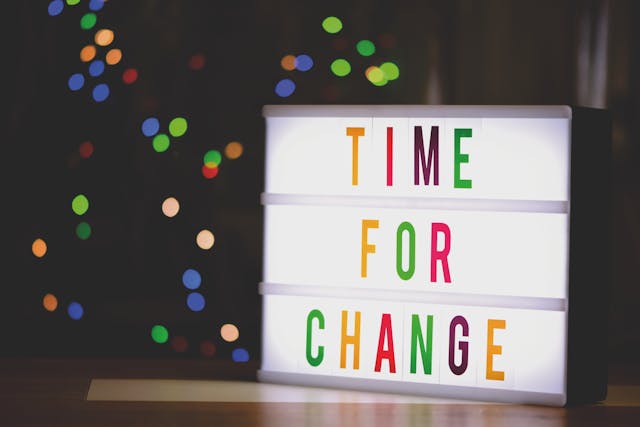It’s Not Our Place to Change Them

In relationships—whether romantic, familial, or platonic—we often encounter people whose habits, beliefs, or behaviors may not align with our own. It’s only natural to want those we care about to grow, improve, and be the best version of themselves. However, a common mistake many of us make is thinking that it’s our job to change them. The truth is, it’s not our place to change others, and when we try to do so, we risk damaging the very relationship we’re trying to improve.
In this article, we’ll explore why we cannot and should not attempt to change other people, the negative consequences that come with trying to force change, and the healthier alternatives for fostering growth in those we love without losing sight of their autonomy.
Understanding the Root of the Desire to Change Others
The desire to change someone often comes from a place of good intentions. We see potential in others and want to help them realize it. We may want them to be more responsible, more open, or more understanding. It’s easy to believe that if they just made a few adjustments, everything would be better.
Why We Want to Change People:
- We care about them: We want the best for the people we love. If we notice unhealthy behaviors or patterns that could harm them, it’s natural to want to step in and fix things.
- We believe in their potential: Sometimes, we see someone struggling, and we think that if they could change certain things, they could be happier or more successful.
- We want to control the outcome: At times, we try to change others because we believe it will make us feel more secure in the relationship or more in control of the situation.
But the reality is that even the most well-intentioned attempts to change someone can lead to frustration, resentment, and the breakdown of trust in a relationship.
Why It’s Not Our Place to Change Someone
Each individual is unique, with their own personality, beliefs, values, and life experiences. While we may see certain things we want to “fix,” it’s crucial to understand that we can’t change another person unless they are willing to change themselves. Here’s why:
- Personal Growth Must Be Self-Driven
Personal growth and change must come from within. No one can truly change unless they are motivated to do so. Self-motivation is the key to any lasting transformation. Forcing someone to change based on our own desires doesn’t lead to genuine growth; instead, it can create resistance and resentment.
- It Can Lead to Resentment and Control Issues
When we try to change someone, it often makes the other person feel as though they’re not good enough the way they are. This can result in feelings of resentment and insecurity. Instead of fostering a loving relationship, it can create an environment of tension and control. People want to feel loved and accepted as they are—not as projects that need fixing.
- It Limits Authenticity and Self-Expression
Every individual has the right to be their authentic self, even if their preferences, beliefs, or habits are different from ours. By attempting to change someone, we can unknowingly stifle their self-expression and creativity. Instead of encouraging them to be their true selves, we may make them feel like they need to mold themselves into someone else’s image of “perfect.”
Don’t Miss: Full List of What You Deserve in a Relationship
The Negative Effects of Trying to Change Someone
Trying to change someone can have several negative effects—both on the person being changed and on the relationship itself. Let’s take a closer look at how it can impact both parties involved.
For the Person Being Changed:
- Loss of self-esteem: Constantly being told that you need to change can chip away at your confidence and make you question your self-worth. This is especially true if the change is perceived as something necessary for the other person to love or accept you.
- Feelings of resentment: When someone tries to change you, it can feel like an invasion of your autonomy. Over time, this can lead to frustration and resentment.
- Decreased motivation to change: Ironically, when we try to force someone to change, it often has the opposite effect. People are more likely to resist change when they feel pressured or manipulated.
For the Relationship:
- Stifles connection: Relationships thrive on mutual respect and understanding. When we attempt to change someone, we create an imbalance in the relationship, focusing more on what needs to be fixed rather than nurturing the bond.
- Erodes trust: Constantly trying to change someone undermines trust. The person being “changed” may begin to feel like their true self isn’t accepted, creating emotional distance.
- Strains communication: Communication can break down when one partner constantly feels criticized or told what to do. This can lead to misunderstandings and conflicts that could have been avoided with healthier communication.
Healthy Ways to Foster Growth Without Changing Someone
While it’s not our place to change others, there are ways to encourage growth and support positive change in those we love. Instead of trying to change someone, we can create an environment that fosters their personal development and empowers them to make changes on their own terms.
- Lead by Example
One of the most effective ways to influence change is by leading through example. When we focus on our own growth and work on being the best version of ourselves, we naturally inspire others to do the same. When you show up as your authentic self, making positive changes in your own life, others may begin to notice and want to improve themselves, too—without feeling coerced.
- Be Supportive, Not Critical
Instead of criticizing or pointing out flaws, focus on providing positive support. Acknowledge the person’s strengths and encourage them to pursue their own interests or personal growth goals. Offer encouragement and provide a safe space for them to be themselves while gently suggesting ways they might improve, if they’re open to it.
- Communicate Openly and Respectfully
Open and respectful communication is key to any relationship. If you feel there are areas for growth or improvement, discuss them respectfully without judgment or pressure. Share your thoughts in a way that doesn’t attack the other person but instead encourages dialogue and understanding. Healthy communication helps both partners feel heard, valued, and respected.
Read Also: The 7 Factors That Determine Compatibility in a Relationship
Respect Their Autonomy
Remember that everyone has their own path in life. It’s important to respect your partner’s autonomy and support them on their journey, even if it differs from yours. Offer advice when it’s asked for, but don’t impose your beliefs or values on them. Respect their individuality, and allow them to grow at their own pace.
When It’s Time to Let Go
There may come a time when you realize that your partner or loved one is not willing to change, and that’s okay. Sometimes, the best thing we can do is let go and accept that not everyone is meant to grow in the way we envision. If your values, goals, or visions for the future are incompatible, it may be time to evaluate whether the relationship is right for both of you.
Why Letting Go Can Be Healthy:
- Prevents emotional burnout: Trying to change someone who isn’t ready to change can be emotionally exhausting. Letting go allows both parties to focus on personal growth separately.
- Fosters self-respect: By letting go of the desire to change someone, you respect both your needs and their autonomy. You recognize that it’s not your job to alter them—it’s their journey.
- Allows room for healthier relationships: Sometimes, letting go is the best way to make space for relationships that are more aligned with your values and aspirations.
Conclusion: Embrace Acceptance and Growth
In any relationship, it’s important to remember that change must come from within. While it’s natural to want the people we care about to be the best version of themselves, trying to force that change is often counterproductive. Instead, we should focus on supporting each other’s growth, offering encouragement, and creating an environment where both partners can thrive in their own authentic way.
True love and respect come from accepting one another as we are, not as who we think the other person should be. It’s not our place to change others—but it is our place to love and support them, no matter where they are on their journey.
You May Like: 10 Things to Do in the Evening Instead of Watching Netflix
FAQs
- How can I encourage my partner to change without pushing them?
Focus on open communication, lead by example, and offer encouragement without judgment. Create a space for them to grow at their own pace. - Why do we feel the need to change others?
We often feel the need to change others because we care about them and want the best for them. However, it’s important to recognize that true growth must come from within. - What should I do if my partner isn’t willing to change?
Respect their autonomy and focus on your own growth. If the relationship is no longer fulfilling, consider whether it’s time to move on. - Can you still love someone if they’re not changing?
Yes, you can love someone while respecting their individuality. It’s important to accept them as they are, while also making space for personal growth. - How can I stop trying to change my partner?
Recognize that change is only possible when the person is ready. Focus on loving them for who they are, and allow them the space to evolve naturally.






